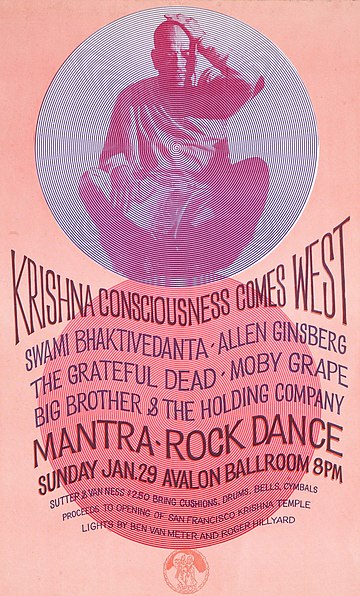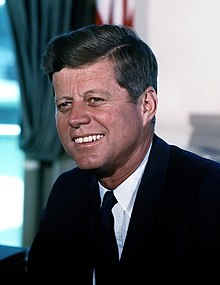Portal:1960s
The 1960s Portal
The 1960s became synonymous with the new, radical, and subversive events and trends of the period. In Africa the 1960s was a period of radical political change as 32 countries gained independence from their European colonial rulers. Some commentators have seen in this era a classical Jungian nightmare cycle, where a rigid culture, unable to contain the demands for greater individual freedom, broke free of the social constraints of the previous age through extreme deviation from the norm. Christopher Booker charts the rise, success, fall/nightmare and explosion in the London scene of the 1960s. However, this alone does not explain the mass nature of the phenomenon. Several nations such as the U.S., France, Germany and Britain turned to the left in the early and mid 1960s. In the United States, John F. Kennedy, a Keynesian and staunch anti-communist, pushed for social reforms. His assassination in 1963 was a stunning shock. Liberal reforms were finally passed under Lyndon B. Johnson including civil rights for African Americans and healthcare for the elderly and the poor. Despite his large-scale Great Society programs, Johnson was increasingly reviled by the New Left at home and abroad. The heavy-handed American role in the Vietnam War outraged student protestors across the globe, as they found peasant rebellion typified by Ho Chi Minh and Che Guevara more appealing. Italy formed its first left-of-center government in March 1962 with a coalition of Christian Democrats, Social Democrats, and moderate Republicans. Socialists joined the ruling block in December 1963. In Britain, the Labour Party gained power in 1964. In Brazil, João Goulart became president after Jânio Quadros resigned. This is a Featured article, which represents some of the best content on English Wikipedia..
Sgt. Pepper's Lonely Hearts Club Band is the eighth studio album by the English rock band the Beatles. Released on 26 May 1967, Sgt. Pepper is regarded by musicologists as an early concept album that advanced the roles of sound composition, extended form, psychedelic imagery, record sleeves, and the producer in popular music. The album had an immediate cross-generational impact and was associated with numerous touchstones of the era's youth culture, such as fashion, drugs, mysticism, and a sense of optimism and empowerment. Critics lauded the album for its innovations in songwriting, production and graphic design, for bridging a cultural divide between popular music and high art, and for reflecting the interests of contemporary youth and the counterculture. At the end of August 1966, the Beatles had permanently retired from touring and pursued individual interests for the next three months. During a return flight to London in November, Paul McCartney had an idea for a song involving an Edwardian military band that formed the impetus of the Sgt. Pepper concept. For this project, they continued the technological experimentation marked by their previous album, Revolver (1966), this time without an absolute deadline for completion. Sessions began on 24 November at EMI Studios with compositions inspired by the Beatles' youth, but after pressure from EMI, the songs "Strawberry Fields Forever" and "Penny Lane" were released as a double A-side single in February 1967 and left off the LP. The album was then loosely conceptualised as a performance by the fictional Sgt. Pepper band, an idea that was conceived after recording the title track. (Full article...)This is a Good article, an article that meets a core set of high editorial standards.
Knife Edge Two Piece 1962–65 is an abstract bronze sculpture by Henry Moore. It is one of Moore's earliest sculptures in two pieces, a mode that he started to adopt in 1959. Its form was inspired by the shape of a bone fragment. Moore created the sculpture from an edition of 10 working models in 1962; these working models are now in public collections. Moore created four full-size casts between 1962 and 1965, with one retained by him. The three casts are on public display on College Green in Westminster, London; Queen Elizabeth Park in Vancouver; and the garden at Kykuit, the house of the Rockefeller family in Tarrytown, New York. Moore's own cast is on display at his former studio and estate, 'Hoglands' in Perry Green, Hertfordshire in southern England. A similar work, Mirror Knife Edge 1977 (or Knife Edge Mirror Two Piece), is displayed at the entrance to I. M. Pei's east wing of the National Gallery of Art in Washington, D.C. The Westminster cast was donated by Moore through the Contemporary Art Society to what he believed was the City of London, but its actual ownership was undetermined for many years. The Westminster cast subsequently fell into disrepair, and was restored in 2013 after it became part of the British Parliamentary Art Collection; it was granted a Grade II* listing in January 2016. (Full article...) Selected picture - The Mantra-Rock Dance musical event took place on January 29, 1967, at the Avalon Ballroom in San Francisco and came to be dubbed as the "ultimate high" and the "major spiritual event" of the hippie era. It was organized by the early followers of the Hare Krishna movement as a promotional and fundraising effort for their first temple on the West Coast. One of them, Harvey W. Cohen, created the Stanley Mouse inspired promotional poster (pictured). The Mantra-Rock Dance featured the Hare Krishna founder Bhaktivedanta Swami, the countercultural ideologues Allen Ginsberg and Timothy Leary, and leading rock groups the Grateful Dead, Moby Grape, and Janis Joplin with Big Brother and the Holding Company. The event caused the Hare Krishna mantra to be adopted by all levels of the counterculture as a "loose commonality" and a viable alternative to drugs.
Did you know -
Related portalsThis is a Featured article, which represents some of the best content on English Wikipedia..
Sir Richard Starkey MBE (born 7 July 1940), known professionally as Ringo Starr, is an English musician, songwriter and actor who achieved international fame as the drummer for the Beatles. Starr occasionally sang lead vocals with the group, usually for one song on each album, including "Yellow Submarine" and "With a Little Help from My Friends". He also wrote and sang the Beatles songs "Don't Pass Me By" and "Octopus's Garden", and is credited as a co-writer of four others. Starr was afflicted by life-threatening illnesses during childhood, with periods of prolonged hospitalisation. As a teenager Starr became interested in the UK skiffle craze and developed a fervent admiration for the genre. In 1957, he co-founded his first band, the Eddie Clayton Skiffle Group, which earned several prestigious local bookings before the fad succumbed to American rock and roll around early 1958. When the Beatles formed in 1960, Starr was a member of another Liverpool group, Rory Storm and the Hurricanes. After achieving moderate success in the UK and Hamburg, he quit the Hurricanes when he was asked to join the Beatles in August 1962, replacing Pete Best. (Full article...)This is a Good article, an article that meets a core set of high editorial standards.
Fidel Alejandro Castro Ruz (/ˈkæstroʊ/ KASS-troh, Latin American Spanish: [fiˈðel aleˈxandɾo ˈkastɾo ˈrus]; 13 August 1926 – 25 November 2016) was a Cuban revolutionary and politician who was the leader of Cuba from 1959 to 2008, serving as the prime minister of Cuba from 1959 to 1976 and president from 1976 to 2008. Ideologically a Marxist–Leninist and Cuban nationalist, he also served as the first secretary of the Communist Party of Cuba from 1965 until 2011. Under his administration, Cuba became a one-party communist state; industry and business were nationalized, and socialist reforms were implemented throughout society. Born in Birán, the son of a wealthy Spanish farmer, Castro adopted leftist and anti-imperialist ideas while studying law at the University of Havana. After participating in rebellions against right-wing governments in the Dominican Republic and Colombia, he planned the overthrow of Cuban president Fulgencio Batista, launching a failed attack on the Moncada Barracks in 1953. After a year's imprisonment, Castro travelled to Mexico where he formed a revolutionary group, the 26th of July Movement, with his brother Raúl Castro and Ernesto "Che" Guevara. Returning to Cuba, Castro took a key role in the Cuban Revolution by leading the Movement in a guerrilla war against Batista's forces from the Sierra Maestra. After Batista's overthrow in 1959, Castro assumed military and political power as Cuba's prime minister. The United States came to oppose Castro's government and unsuccessfully attempted to remove him by assassination, economic embargo, and counter-revolution, including the Bay of Pigs Invasion of 1961. Countering these threats, Castro aligned with the Soviet Union and allowed the Soviets to place nuclear weapons in Cuba, resulting in the Cuban Missile Crisis—a defining incident of the Cold War—in 1962. (Full article...)Selected article -John Fitzgerald Kennedy (May 29, 1917 – November 22, 1963), often referred to as JFK, was an American politician who served as the 35th president of the United States from 1961 until his assassination in 1963. He was the youngest person elected president. Kennedy served at the height of the Cold War, and the majority of his foreign policy concerned relations with the Soviet Union and Cuba. A Democrat, Kennedy represented Massachusetts in both houses of the United States Congress prior to his presidency. Born into the prominent Kennedy family in Brookline, Massachusetts, Kennedy graduated from Harvard University in 1940, joining the U.S. Naval Reserve the following year. During World War II, he commanded PT boats in the Pacific theater. Kennedy's survival following the sinking of PT-109 and his rescue of his fellow sailors made him a war hero and earned the Navy and Marine Corps Medal, but left him with serious injuries. After a brief stint in journalism, Kennedy represented a working-class Boston district in the U.S. House of Representatives from 1947 to 1953. He was subsequently elected to the U.S. Senate, serving as the junior senator for Massachusetts from 1953 to 1960. While in the Senate, Kennedy published his book, Profiles in Courage, which won a Pulitzer Prize. Kennedy ran in the 1960 presidential election. His campaign gained momentum after the first televised presidential debates in American history, and he was elected president, narrowly defeating Republican opponent Richard Nixon, the incumbent vice president. (Full article...)More Did you know (auto generated)
TopicsCategoriesWikiProjects
Associated WikimediaThe following Wikimedia Foundation sister projects provide more on this subject:
Discover Wikipedia using portals |






























